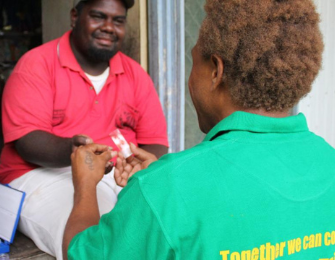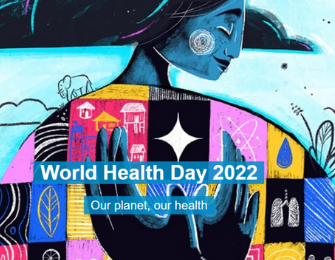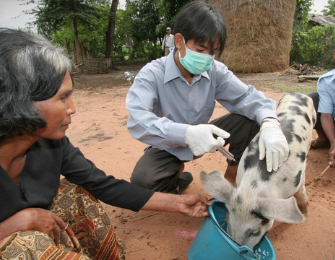The Stronger Systems for Health Security Program is a key investment of the Australian Government’s Indo-Pacific Health Security Initiative. Following a competitive peer review process, convened by the National Health and Medical Research Council, and a DFAT selection process, seven grants were selected totalling AU$16 million over 3 years.
The grants involve research and capacity building activities in Indonesia, Papua New Guinea, Fiji, Timor-Leste and Vietnam to address key health security challenges. This Program will help countries in our region respond to infectious disease threats by strengthening health systems and surveillance and response mechanisms, and also invests in Australian research.
Accelerating the Development of Evidence-based Policy and Practice (ADEPPt) in Papua New Guinea
Lead: Professor David Durrheim, University of Newcastle
This project will bring together and upskill frontline healthcare practitioners and senior policymakers to identify and address large-scale local health system problems, such as barriers to vaccination uptake. The project will assess the effectiveness of the model used to upskill the workforce for application in other settings.
Partners:
- Australian National University
- The University of New England
- Hunter New England Local Health District
- National Department of Health, Papua New Guinea
- University of Papua New Guinea
- World Health Organization
Funding: $1,480,000
University of Newcastle Media Release
Stronger Health Systems for multidrug-resistant tuberculosis and malaria (Indonesia and Papua New Guinea)
Lead: Professor Richard (Ric) Price, Menzies School of Health Research
Multidrug-resistant tuberculosis and multidrug-resistant malaria pose major public health challenges, threatening health security across the Asia-Pacific region. This project involves the development and implementation of a package of cost-effective interventions for the cure of multi-drug resistant malaria. It also involves implementing new approaches to tuberculosis case detection and prevention, particularly multi-drug resistant strains. The team will support and upskill local researchers to address both diseases.
Partners:
- Burnet Institute
- University of Melbourne
- Gadjah Mada University
- Indonesia National Department of Health, Papua New Guinea
Funding: $3,000,000
Stronger Surveillance and Systems Support for Rapid Identification and Containment of Resurgent or Resistant Vector Borne Pathogens in Papua New Guinea
Lead: Doctor Leanne Robinson, Burnet Institute
PNG has a substantial burden of endemic and emerging diseases. There is a pressing need for continuous surveillance, rapid diagnosis and real-time tracking of emerging and resurgent infectious diseases. This project will evaluate and implement real-time surveillance for malaria and other vector-borne illnesses in PNG and will provide early warning of drug-resistance and insecticide resistant vectors. The project will also strengthen PNG’s outbreak response capability by providing decision support tools to frontline healthcare workers and policymakers.
Partners:
- The Walter and Eliza Hall Institute of Medical Research
- James Cook University
- Australian Army Malaria Institute
- Papua New Guinea Institute of Medical Research
- Central Public Health Laboratory, Papua New Guinea
- Papua New Guinea National Department of Health
Funding: $3,000,000
Improving the dispensing of antibiotics by private drug sellers in Indonesia: a missing ingredient in the fight against antimicrobial resistance
Lead: Associate Professor Virginia Wiseman, Kirby Institute - University of New South Wales
Self-medication and over the counter supply of antibiotics, a widespread practice in Indonesia and Southeast Asia, is recognised as a key driver of antimicrobial resistance. This study will investigate the context in which drug sellers operate and evaluate interventions to improve antibiotic dispensing.
Partners:
- Gadjah Mada University,
- Indonesia Sebelas Maret University
- London School of Hygiene and Tropical Medicine
- The George Institute for Global Health
Funding: $ 1,910,000
Securing health in Fiji through strengthened health systems and integrated water management to tackle the Three Plagues: typhoid, dengue and leptospirosis
Lead: Associate Professor Joel Negin, University of Sydney
Water-borne diseases are endemic in Fiji with 20 reported typhoid outbreaks since 2005, an outbreak of dengue affecting 27,000 in 2013-14 and a three-fold increase in leptospirosis since 2016. This project will develop and test real-time mobile tools to optimise water, sanitation and catchment management to reduce the incidence of outbreaks. It will also train cross-sectoral teams to improve outbreak response and minimise the impact of water-borne diseases.
Partners:
- Edith Cowan University
- Fiji Ministry of Health & Medical Services
- Fiji National University
- World Health Organisation, Geneva
Funding: $2,010,000
University of Sydney Press Release
Combating the emergence and spread of antimicrobial resistant infectious diseases in Vietnam: the V-RESIST study
Lead: Associate Professor Gregory Fox, University of Sydney
Drug resistant infections are on the rise across the Indo-Pacific region, leading to poor treatment outcomes. This project will evaluate an intervention in Vietnam to reduce inappropriate use of antibiotics, a known driver of antimicrobial resistance. This study will help to understand and target the drivers of drug resistance, and ultimately preserve the effectiveness of life-saving antibiotics.
Partners:
- University of New South Wales
- Burnet Institute
- University of Melbourne
- Australian National University
- Hanoi Medical University, Vietnam
- Vietnam Ministry of Health
- National Lung Hospital, Vietnam
- National Institute of Hygiene and Epidemiology, Vietnam
- Pasteur Institute, Vietnam
- Health Strategy and Policy Institute, Vietnam
- Oxford University Clinical Research Unit, Vietnam
- Medicine and Pharmacy University, Vietnam
- Karolinska Institutet, Sweden Woolcock Institute of Medical Research
Limited Funding: $2,480,000
University of Sydney Press Release
Surveillance Training, Research Opportunities and National Guidelines for communicable disease control in Timor-Leste (STRONG TL)
Lead: Doctor Joshua Francis, Menzies School of Health Research
Ongoing transmission of infections and development of antibiotic resistance pose immense health challenges in Timor Leste. Local and international experts will work together to deliver high-quality disease surveillance; develop and implement national guidelines; and strengthen operational research capacity.
Partners:
- Northern Territory Department of Health
- Australian National University
- Royal Darwin Hospital
- National Institute of Health - East Timor National
- University of East Timor
Funding: $2,120,000




